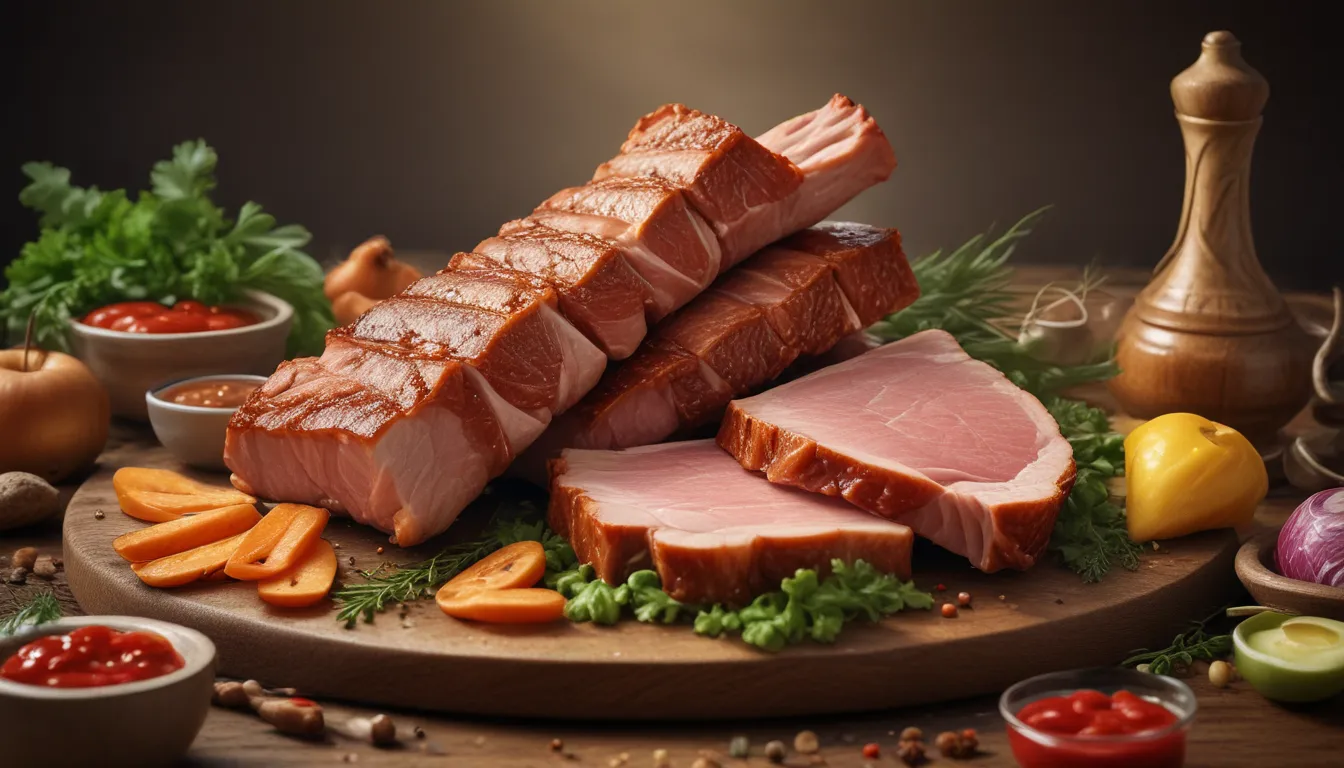The pictures in our articles might not always show exactly what the text is talking about. We use these images to make the article more interesting and eye-catching. They are there to add to the text, but not to replace it or show every detail.
Are you a fan of the delectable taste of pork ribs? Do you enjoy savoring them grilled, smoked, or slow-cooked? Pork ribs are not only a popular dish worldwide but also pack a nutritional punch. In this article, we will explore 20 fascinating nutritional facts about pork ribs, shedding light on their protein content, essential vitamins, and minerals. So, if you're curious about the health benefits of pork ribs, keep reading to discover some surprising insights.
Exploring the Nutritional Value of Pork Ribs
Pork ribs offer a myriad of essential nutrients that are vital for your overall health and well-being. Let's delve into some key nutritional aspects of this beloved meat:
- Calories: A typical serving of pork ribs contains around 280-320 calories, making them a flavorful protein source.
- Protein: Pork ribs are a great source of protein, with approximately 24-28 grams per serving, essential for muscle repair and growth.
- Fat: Contrary to popular belief, not all fats are bad for you. Pork ribs contain a moderate amount of fat, with approximately 18-22 grams per serving.
- Saturated Fat: While pork ribs do contain saturated fat (about 6-8 grams per serving), it is advisable to consume them in moderation.
- Cholesterol: Pork ribs also contain cholesterol, with approximately 70-90 milligrams per serving. It is essential to monitor your dietary cholesterol intake for overall heart health.
The Essential Vitamins and Minerals in Pork Ribs
In addition to being a protein powerhouse, pork ribs are also rich in essential vitamins and minerals that support various bodily functions:
- Vitamins: Pork ribs are a good source of vitamins B6 and B12, crucial for maintaining healthy brain function and forming red blood cells.
- Minerals: Pork ribs contain essential minerals like zinc, magnesium, and selenium, which play a vital role in immune system health and enzyme activity.
- Iron: With approximately 1.5-2 milligrams of iron per serving, pork ribs contribute to the production of red blood cells, essential for oxygen transport in the body.
- Potassium: Pork ribs are a source of potassium, an important mineral for regulating blood pressure and supporting heart health.
- Calcium: While not a significant source, pork ribs provide about 20-30 milligrams of calcium per serving, contributing to bone health.
Dietary Considerations for Pork Ribs
When enjoying pork ribs, it's crucial to be mindful of certain dietary considerations to ensure you're making healthy choices:
- Sodium: Pork ribs can be high in sodium, with approximately 600-800 milligrams per serving. Individuals on a low-sodium diet should consume them in moderation.
- Fiber: Pork ribs are not a significant source of dietary fiber, so it is important to pair them with high-fiber foods to meet your daily requirements.
- Omega-3 Fatty Acids: While not a significant source, pork ribs do contain small amounts of omega-3 fatty acids, contributing to overall dietary intake.
- Carbohydrates: Pork ribs are low in carbohydrates, making them a suitable choice for individuals following a low-carb or ketogenic diet.
- Sugar: Pork ribs are typically low in sugar, making them a good option for those watching their sugar intake.
Cooking and Enjoying Pork Ribs
Pork ribs are not only nutritious but also known for their delicious flavor, making them a popular choice for barbecues and gatherings. Here are some tips for preparing and enjoying pork ribs:
- Versatile Cooking Options: Pork ribs can be cooked in various ways, including barbecuing, slow cooking, or even in stews, allowing for a wide range of culinary possibilities.
- Source of Energy: Pork ribs provide a good source of energy due to their calorie and protein content, making them an excellent choice for athletes or those needing an energy boost.
Incorporating Pork Ribs Into Your Diet
After exploring the nutritional benefits of pork ribs, it's clear that they can be a delicious and nutritious addition to your diet when consumed in moderation. To enjoy pork ribs as part of a balanced meal:
- Portion Control: The recommended portion size for pork ribs is approximately 3-4 ounces, cooked weight. Enjoy them alongside other nutrient-dense foods for a well-rounded meal.
- Healthy Preparation: Trim excess fat from the ribs and opt for healthier cooking methods like grilling, baking, or broiling to reduce calorie and fat content.
- Dietary Restrictions: Pork ribs are naturally gluten-free, making them a safe choice for individuals with gluten sensitivities or celiac disease.
Conclusion
Incorporating pork ribs into your meal planning can add variety and flavor to your diet. While they offer essential nutrients like protein, vitamins, and minerals, it's important to enjoy them in moderation due to their high fat content. By balancing your pork rib consumption with other lean protein sources and plenty of fresh vegetables, you can create delicious and satisfying meals that support your overall health and well-being.
FAQs
Q: Are pork ribs a healthy food option?
A: While pork ribs offer essential nutrients, they are also high in fat. It is recommended to enjoy them in moderation as part of a balanced diet.
Q: How should I prepare pork ribs to make them healthier?
A: Trim excess fat from the ribs and opt for healthier cooking methods such as grilling, baking, or broiling. Avoid breading or deep-frying to reduce the calorie and fat content.
Q: Can I include pork ribs in a low-carb diet?
A: Yes, pork ribs are a suitable choice for those following a low-carb diet as they contain minimal carbohydrates. Be mindful of portion sizes and added sugars in sauces or seasonings.
Q: What are the recommended portion sizes for pork ribs?
A: The recommended portion size for pork ribs is approximately 3-4 ounces, cooked weight. Enjoy them alongside nutrient-dense foods for a balanced meal.
Q: Can pork ribs be part of a gluten-free diet?
A: Yes, pork ribs are naturally gluten-free. Check sauces and marinades for gluten-containing additives.
Whether you're a seasoned pork rib enthusiast or looking to explore new culinary delights, pork ribs offer a delicious and nutrient-rich option for your next meal. Enjoy the savory taste and nutritional benefits of pork ribs in moderation, and savor every bite knowing you're nourishing your body with essential nutrients.






